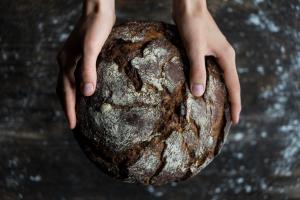
Searing pain yanked her into consciousness and out of her dream—a dream so lovely that she struggled to nestle back into it.
The dream took her back to her youth—eight or nine, perhaps—and she felt wild and free as she ran around the family compound playing hide and seek with her brothers and sisters. The sun warmed her face, the smell of baking bread filled the air, and laughter bubbled up from her heart and out of her lips. But as the pain sharpened the laughter grew faint, and she opened her eyes to reality.
A strip of sunlight peeked in from underneath her door; the only light visible in her small home. Chaviva lifted herself slowly off her mat, lit a lamp, and turned to look at her bedclothes.
Please, please, please, she silently begged. Jehova Rapha, Jehova Jireh, El Elyon, please have mercy on your servant.
The bright red bloodstain glared angrily back at her, mocking her, taunting her, stripping her of any residual joy the dream had left behind.
Weakly, she sat back down on the stained clothes, put her head in her hands and sighed.
Today marked twelve years of bleeding.
Some days lighter than others, but for twelve long years, the illness plagued her, keeping her from her family, her community, and her God.
The Law clearly stated that a woman with a bloody discharge, monthly period or not, could not participate in the readings or sacrifices due to her ceremonial uncleanliness. Not only that, she soiled anything and everyone she touched.
For years she had clung to hope, spending everything she had on doctors, but instead of getting better she grew worse. Now she lived on the charity of others.
Chaviva scraped together some flour and oil to make a cake, crinkling her nose as she chewed. What she would give for some honey! Quickly she chastised her ungrateful heart, asked for forgiveness, and thanked the LORD for his provision.
Gathering her soiled clothes in a basket, she made her way to the Sea of Galilee. The familiar ache of loneliness welled up within her at the sound of chatting and laughter. Giving the village women a wide berth, she chose a more secluded spot farther down the path.
Chaviva waded into the water with her clothes when a shriek stopped her in her tracks.
“Stop, Elazar! Come back!”
Startled, Chaviva dropped her bundle. Whipping around, she saw a young cherub of a boy standing on the shore, not ten feet from her. A mess of soft, curly tendrils topped his head; his dark eyes gleamed with curiosity. He looked at his mother and back at Chaviva, and took two tentative steps toward the water.
Chaviva quickly backed away, tripped over her feet, and tumbled down with a great splash. The little boy giggled with delight and took another step before his mother swept him up into her arms.
“No, Elazar, you will dirty yourself!”
The woman glared at Chaviva with a look that could freeze fire and hissed, “Find another spot before you make all of us unclean!”
She sat frozen to the spot, paralyzed with horror and humiliation. A rushing sound filled her ears and the bright daylight grew dim. She put her head between her knees and breathed deeply until the dizziness passed.
Finally, Chaviva got up, wrung out her clothes, and slowly made her way back home.
“Dodah Chaviva!”
She turned around slowly, a weary smile stretching across her face and lighting up her eyes. It was Leah, the oldest daughter of her youngest brother. For the last few years,her niece had faithfully brought her wheat, oil, and scraps of meat. A week ago, Chaviva had walked out of her house to find new robes folded neatly by her door and suspected Leah had left them there.
“Leah,” she exclaimed, longing to embrace the beautiful young woman, “were you the one who left the new robes? Thank you, sweet girl!”
Leah smiled mischievously. “I know nothing about that!”
The two walked back toward their village, stopping several times so Chaviva could rest.
“Dodah Chaviva,” said Leah, “I heard at the well that Jesus arrived today.”
Something inside Chaviva leaped. She had heard the villagers talking about this man. Some called him a heretic, a blasphemer, but others a prophet or even the Messiah.
“What of this Jesus, sweet girl?” she asked guardedly.
Dodah, this man can help! He will heal you of your sickness. You must come.”
A lump swelled in Chaviva’s throat. How she wanted to see this man. How she yearned for healing, to sit at her family’s table, to worship in the synagogue. For twelve lonely years, she had stood on the fringe, and now she was afraid to hope. She looked at her niece and shook her head.
“I cannot see him, Leah. I cannot risk making others unclean. They would stone me at the gates.”
“Dodah, remember Emet? His friends took him to Jesus. They broke through someone’s roof and lowered him down, and Jesus healed him! He told Emet to pick up his mat and walk and he did. He heals the sick. He casts out demons. Surely this man is the Christ!”
Almost against her will a seed of hope sprouted in her heart and began to grow. Would this man see her? Could He heal her? Dare she venture out into the village? Leah was saying something in hushed tones, almost too fast to understand.
“You have new robes. We’ll cover your face. I’ll hold your hand—don’t look at me like that, I don’t care about cleanliness and you don’t have a choice! You’re dying, Dodah Chaviva. We must try.”
At this, Leah grabbed her by the shoulders, her tiny size betraying her strength. “We leave now. Jesus can stop your bleeding.”
Chaviva jerked to throw off her niece’s arms, but Leah had her in an iron grip. One tear slipped down her cheek, followed by another, and still another.
“Alright,” she whispered, “we will go.”












